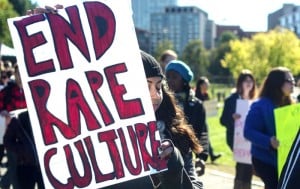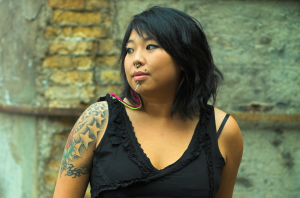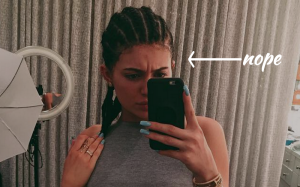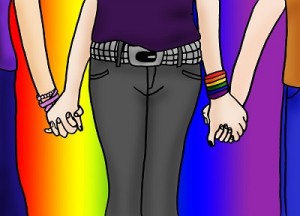Content warning: sexual assault, genital mutilation
When I first learned about Men’s Rights Activists (MRAs), a group of people aimed at giving men access to the same opportunities as other a/genders, I didn’t realize they had a reputation for being anti-feminist. In fact, a lot of their ideas seemed pretty feminist to me.
They wanted men to have the chance to be caretakers as well as breadwinners. They wanted all crime victims to be taken seriously. They wanted an end to stereotypes.
But once I became known to MRAs as a feminist, many let me know they weren’t on my side.
I started getting angry tweets complaining about how women ruled the world and men were oppressed.
A few even used sexist insults against me.
I ignored them for the most part, but when I tried to engage with them, they seemed more interested in trolling me than exchanging ideas.
How could people who seemingly agree on so much become such adversaries?
At their worst, MRAs are simply looking to justify misogyny under the guise of “rights.” At their best, people with MRA-like beliefs sometimes start off from the same place as feminists – wanting gender equity – but then disagree about how to go about it.
Here are some common MRA arguments that have a point initially but take a wrong turn.
1. Male Survivors Should Be Taken Seriously
Men’s rights activists often accuse feminists of prioritizing female survivors of sexual assault and intimate partner violence while men get ignored. (Non-binary people are unfortunately usually absent from these discussions, even though feminists do acknowledge that they are disproportionately targeted.)
But feminists absolutely are sympathetic to male survivors. Many have spoken and written about the need to take them seriously.
We don’t believe any survivor is more important than any other, and we’re deeply concerned about the ideas about masculinity that lead people to dismiss male survivors. We want to challenge the idea that men always must be strong and can’t seek help.
If we talk disproportionately about sexual assault and intimate partner violence directed toward women and LGBTQIA+ people, that’s because they experience it disproportionately.
Thirty-three percent of women and 39.1% of transgender, genderqueer, questioning, or non-conforming people – compared to 8.6% of men – are sexually assaulted by their senior year of college.
Ninety-eight percent of sex trafficking victims are women and girls. Of all the women murdered in 2012, half of them were killed by their partners or family members, but only one in twenty men were killed by partners or family members.
And that’s not a coincidence.
The violence we experience in our own lives is a reflection of the violent ideologies directed toward us. That’s why we talk about violence toward women and LGBTQIA+ people. Not because it matters more. Because it reflects a troubling pattern.
It reflects that a quarter of young people believe it’s normal for guys to pressure girls into sex. It reflects that in relationships between men and women, men are considered the aggressors while women are the gatekeepers. It reflects that college men are taught “no means yes, yes means anal.”
There are also ideologies that lead men to experience sexual violence and intimate partner violence, like that women aren’t strong enough to hurt men and that men always want sex and are therefore unrapeable.
But there is no societal norm dictating that women should invade men’s personal space, make them feel unsafe in public, and treat their bodies like objects.
Though the outcome is equally bad, there’s a major difference between the beliefs that lead to violence toward men and those that lead to violence toward women and nonbinary people.
People believe certain forms of violence toward men can’t happen, while they believe violence toward other a/genders is normal and okay. Both these ideas stem from a societal belief in male superiority.
So, ultimately, supporting male survivors and supporting female and non-binary survivors go together.
Both require us to challenge patriarchy.
2. Fathers Are as Important as Mothers
Another common men’s rights issue is child custody and, more generally, men’s ability to play as active a role in the family as women do.
Feminists totally agree with this as well. Everyone should have a choice regarding what role they play in the family, and their a/gender shouldn’t factor into that.
In fact, having more equal households benefits people of all a/genders. In relationships between men and women, for example, women whose male partners are helping out around the house are more able to prioritize their careers.
But men’s smaller role in the household is also not evidence that they’re oppressed. Once again, we need to look not just at the way things are, but also at the underlying ideologies.
There’s nothing inherently oppressive about being a stay-at-home parent or being a breadwinner. The oppression lies in the beliefs that leave women confined to the former position while men are confined to the latter and non-binary people are totally erased.
Women are deemed ideal homemakers because people expect free labor from them and don’t consider them as capable of most jobs. Men are deemed ideal breadwinners because they are considered deserving of money and capable of earning it.
Even though its effects can be negative, this belief itself is positive toward men.
Yes, there’s also the belief that men aren’t great with children or household chores. But since childrearing and homemaking are devalued in our society, this belief is not as pejorative as the belief that someone doesn’t belong in the workplace.
Aside from the root ideologies, the other thing that determines whether or not a family structure is oppressive is whether people have a choice. And like MRAs, feminists believe men – and anyone of any gender involved in parenting a child – should have a choice in their familial role.
3. Circumcision Is a Violation of Bodily Autonomy
Some men’s rights activists also talk about circumcision as unjust treatment of people with penises.
Once again, many feminists agree on this. Part of creating a culture of consent is not doing anything to anyone’s body without their permission, and that includes circumcision.
Male circumcision is a feminist issue. However, it is not proof that men are an oppressed gender.
While decreased sensitivity can be an effect of circumcision, it is not its usual purpose. It’s most often done for supposed health or hygiene (which has been debunked as credible) or to honor a religion or culture. In fact, criticism of male circumcision is often thinly veiled anti-Semitism.
But female genital mutilation is performed in attempt to repress women’s sexuality, enhance men’s pleasure, and keep women from having sex outside of marriage so that they can be the property of their husbands. And unlike male circumcision, it has no potential benefits for health or hygiene and has more severe risks.
Again, we can be angry about an issue men face without viewing it as a result of a hierarchy that puts men below people of other a/genders.
4. There’s Nothing Wrong with Men
Lastly, one of MRAs’ biggest complaints against feminists – and people in general – is that they portray men negatively.
And honestly, I’ve had the same complaints about certain feminists – for example, essentialist feminists who say women should be empowered because the world needs more caring and nurturing instead of men and their wars.
That doesn’t represent all feminists, though.
I’ve personally found that most are against this kind of stereotyping. Benevolent sexism isn’t great for women either, after all, since it sets up unfair expectations and advocates only conditional respect.
Feminists acknowledge that most violence against women is committed by men, but we don’t view this as inherent or natural to men. We view it as a result of a patriarchal society that oppresses everyone – as an issue of socialization.
Men are conditioned to be aggressive and domineering toward gender minorities like women through violent depictions of masculinity in the media, pressure to act masculine in front of their peers, and expectations from caregivers starting at a young age. This doesn’t absolve them of responsibility for hurtful behaviors, though.
We don’t hate men. We hate toxic masculinity. We believe men can be better than they’re made out to be. Instead of getting defensive, men should be on board with that.
***
Many MRAs accuse feminists of dismissing the cause of men’s liberation.
But we’re not dismissing it. The idea that all people should have access to the same opportunities and live free from stereotypes is worth fighting for. We just don’t believe in dismissing feminism in the process.
The truth of the matter is, we live in a patriarchal society.
Just look at the numbers: Less than a quarter of national parliamentarians are women. Only 4% of Fortune 500 CEOs are women. Statistics don’t exist for non-binary people at all.The most powerful people in this world are men.
That doesn’t mean the world is fair to men. But if men want liberation from gender roles, they should support feminists, not MRAs.
Feminists are advocating for more generous paternity leave, greater acceptance of men who show emotions and vulnerability, and less pressure for men to play the “masculine” role in their relationships and families.
And while MRAs make many good points, I’ve seen their behavior get really toxic. When they talk about women like men are entitled to them and deny the existence of misogyny, they fuel patriarchy, which hurts people of all a/genders.
But if you’re ready to fight for men’s liberation without putting anyone else down, we welcome you with open arms.
In fact, we desperately need you. Just please understand that men won’t be free from gender roles until oppressed a/genders are as well.
[do_widget id=’text-101′]
Suzannah Weiss is a Contributing Writer for Everyday Feminism. She is a New York-based writer whose work has appeared in The Washington Post, Salon, Seventeen, BuzzFeed, The Huffington Post, Bustle, and more. She holds degrees in Gender and Sexuality Studies, Modern Culture and Media, and Cognitive Neuroscience from Brown University. You can follow her on Twitter @suzannahweiss. Read her articles here.
Search our 3000+ articles!
Read our articles about:
Our online racial justice training
Used by hundreds of universities, non-profits, and businesses.
Click to learn more





















